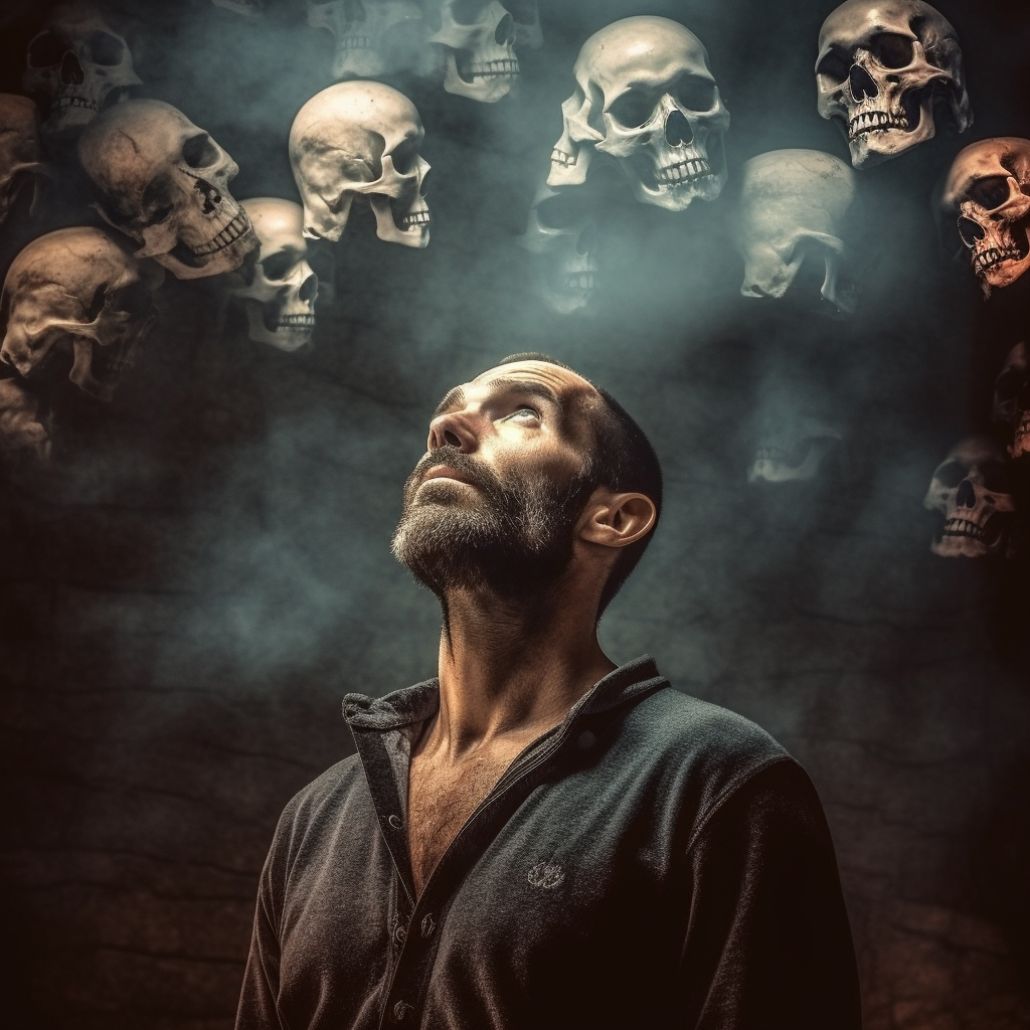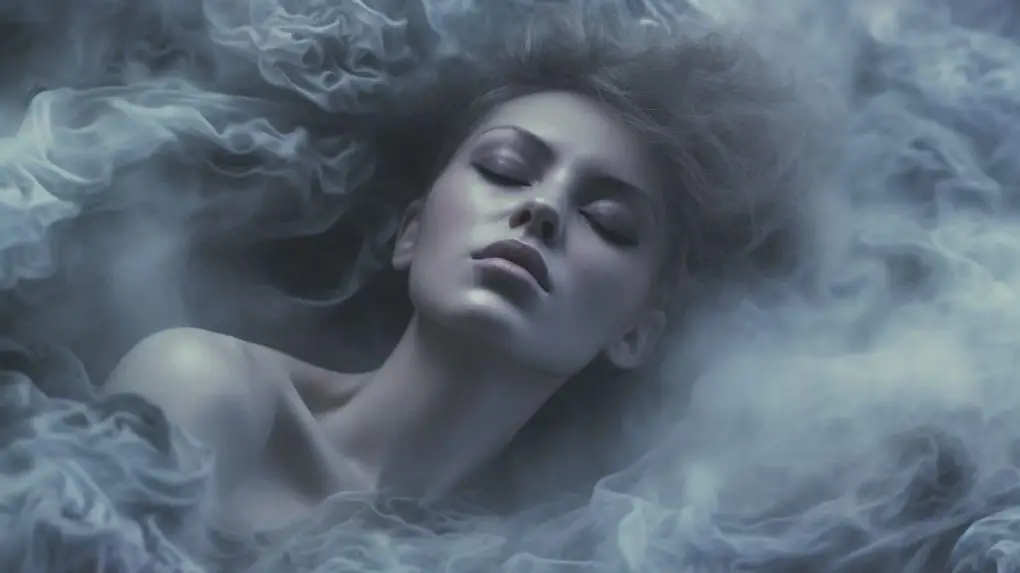Dreams have always been a subject of great intrigue and curiosity for humanity. They serve as a window into our subconscious mind, revealing insights that might remain hidden in our waking life.
Among the myriad dream themes, death dreams have particularly caught the attention of dreamers and analysts alike.
The Intrigue of Dream Interpretation
Dream interpretation dates back to ancient civilizations, where dreams were believed to carry messages from the gods or departed souls. Such dreams were often taken as omens or prophetic insights.
In modern times, while many still believe dreams carry significant spiritual or psychic importance, the scientific community focuses on their psychological implications. Harvard Medical School, among other institutions, conducts studies to understand the mind’s nocturnal activities. Generally speaking, they serve as reflections of our own thoughts, emotions, and experiences from our daily lives.
Death Dreams in Different Cultures and Traditions
Death dreams hold varying significance across cultures. For some, seeing a loved one die in a dream is a bad omen, while for others, it could symbolize a new beginning or a fresh start. Ancient Egyptians, for instance, believed that such dreams were a direct message from the gods. On the other hand, in some Asian cultures, dreaming of death might suggest longevity and good health. Thus, the meaning of a death dream can be profoundly influenced by one’s cultural and personal beliefs.
What Does It Mean When You Die in Your Dream?
Many people wake up startled after dreaming of their own death. It’s a distressing thought – what could it possibly signify? The good news is that death-related dreams rarely forecast literal death. Instead, they often mirror our internal conflicts, fears, and transformations.
The Interpretation of Seeing Your Own Death
Generally speaking, dreaming of your own death can be a manifestation of your subconscious mind addressing fear or anxiety about change. It might represent the end of something, like an old habit, relationship, or phase of life, making way for new beginnings. Dream experts opine that this kind of dream means a transition, potentially marking personal growth or evolution.
The Distinction Between Literal Death and Dream Death
It’s essential to differentiate between the symbolic death we see in dreams and the literal death we know in real life. Dreaming of your own funeral or seeing yourself in a coffin might be jarring, but it’s more likely tied to your fear of the unknown, a feeling of powerlessness, or the need for closure in specific areas of your life. The realm of dreams is symbolic, where death represents not an end, but often a transformation or transition.
Related: The Mythical and Real-Life Giant Squid
Common Death Dreams and Their Implications
Our subconscious processes a vast array of information daily, and the content of our dreams can be influenced by a myriad of factors. Let’s explore some recurrent death-related dream themes.
Seeing a Dead Body
Finding a dead body in a dream can be a shocking experience. This particular dream might not necessarily relate to death but can signify a part of your life that you feel is no longer serving its purpose. Alternatively, it can represent unresolved feelings or issues with the person whose dead body you see.
Dreaming of a Family Member or Loved One’s Death
Such dreams can be deeply unsettling. They often mirror our fears of losing our loved ones or reflect the subconscious processing of our own mortality. However, they can also hint at a desire for a deeper connection with the person or an unresolved conflict.
Dreams of Pets Dying
Dreaming about pets dying can tap into our vulnerability and fear of loss. Pets, often considered family members, symbolize unconditional love and companionship. Dreaming about a pet dying might reflect fears of abandonment or feeling unloved in waking life. Alternatively, it could symbolize a part of you that is neglected or unacknowledged, perhaps an aspect of your own life that needs more care and attention.
The Graveyard Setting in Dreams
Graveyards are common locales in death dreams, symbolizing endings and beginnings. A graveyard setting might signify a period of reflection or mourning for what has passed. It could also represent an unconscious acknowledgment of an aspect of your life that has ended, inviting a new chapter or a fresh start. This could also be related to your own thoughts about death and what happens afterward.
Emotions Tied to Death Dreams
Dreams, especially those involving death, evoke a spectrum of emotions, revealing our deepest fears, regrets, and desires.
Feeling Scared or Anxious
It’s common to feel scared or anxious when someone dies in a dream. Such emotions may arise from unresolved issues or suppressed fears in real life. It could also be a manifestation of distressing emotions in your waking life that you might be avoiding. Understanding the specifics of these emotions, their roots, and triggers can aid in navigating through them both in our waking and dreaming states.
Feeling Sad or Grieving
Sadness or grief in death dreams might symbolize unexpressed sorrow or losses in real life. This could involve losing a loved one, ending a relationship, or any other form of goodbye. These dreams might serve as a platform for our subconscious to process such emotions, navigating through the grieving process without the constraints of our conscious mind’s defense mechanisms.
Other Feelings and Their Significance
Experiencing other feelings, like anger or relief, in death dreams could provide insight into unacknowledged emotions or unresolved issues. Anger might indicate lingering issues or resentments, while relief may highlight a desire to break free from certain people or situations in waking life.
Also read How To Astral Project Safely – A Guide To Successful Out-of-Body Experiences
The Relationship Between Waking Life and Death Dreams
Dreams are deeply interwoven with our waking experiences, casting a light on areas that might need more attention or reflection.
Real-Life Events and Their Influence on Dream Content
Your real-life experiences, especially those related to loss, grief, or changes, significantly impact dream content. Traumatic experiences or the death of a loved one might manifest in dreams as your subconscious tries to process these events, sometimes causing recurring dreams that can lead to emotional distress or even PTSD symptoms.
Death Anxiety and Its Presence in Dreams
Death anxiety is a common phenomenon, driving our actions and thoughts in more ways than we might realize. This fear of death and dying can percolate through our subconscious and become a prevalent theme in our dreams, especially if suppressed or unaddressed during waking hours. It may depict our own death or that of someone close, reflecting our subconscious grappling with our own mortality and the impermanence of life.
Unpacking the Subconscious Mind
The subconscious mind harbors our unexpressed emotions, fears, and desires. Death dreams can serve as a conduit, revealing these underlying factors.
The Impact of PTSD Symptoms on Dreaming
For those who have undergone traumatic events, especially related to death or the threat of it, dreams can become a repetitive and distressing landscape. Post-Traumatic Stress Disorder (PTSD) often presents itself through dreams, as the brain attempts to process traumatic events. This can lead to vivid and recurring nightmares where the dreamer relives the trauma. Recognizing these symptoms and seeking help from a mental health professional can be an essential step in healing and moving forward.
The Role of Lucid Dreaming
Lucid dreaming, where the dreamer becomes aware that they’re dreaming, can be a tool in understanding and even reshaping distressing dreams. This awareness in the dream state allows the individual to confront or change the narrative of the dream.
For some, this can be a therapeutic technique, offering a sense of control in a domain that often feels unpredictable. Engaging in lucid dreaming might help mitigate the negative emotions tied to death dreams and offer new perspectives.
How the Subconscious Deals with Grief and Fear
Grief and fear are potent emotions that often find their way into our dream content. The subconscious mind uses the dream state as a realm to process and understand these emotions, especially when they’re overwhelming in our waking life.
Death dreams can be a reflection of the brain’s effort to deal with loss, fear of the unknown, or anxiety about one’s own mortality. By understanding this, individuals can begin to decipher their dream content and the emotions attached to it, paving the way for emotional resolution.
Interpreting Dreams with Professionals
While personal reflection is invaluable in understanding dream content, sometimes external perspectives can offer clarity.
When to Consult a Mental Health Professional
Dreams of death, especially if they’re recurrent and distressing, can take a toll on one’s mental well-being. It’s crucial to recognize when these dreams indicate deeper underlying issues. If such dreams lead to anxiety, depression, or affect daily life, consulting a mental health professional can be beneficial. They can provide coping strategies, therapeutic interventions, and insights into the dream’s potential meaning.
The Expertise of Dream Analysts
Dream analysts specialize in deciphering the symbolic nature of dreams. Their expertise lies in understanding the collective and personal symbols presented in dream content.
By delving into one’s background, personal experiences, and emotions, dream analysts can offer interpretations that might be overlooked by the dreamer. Their insights can provide comfort, understanding, and direction for individuals grappling with particularly vexing dreams.
Expert Perspectives on Dreams of Death
Different dream experts might have varying interpretations based on cultural, psychological, and personal beliefs. Some might view dreaming of people dying as a reflection of major changes looming in one’s life, while others might see it as an indicator of feeling anxious about a personal situation. It’s essential to seek multiple perspectives to gather a comprehensive understanding.
You may also like The Journey of the Dead – Can Someone Who Has Died Still See Us?
Navigating the Emotions Elicited by Death Dreams
Dreams can evoke a wide range of emotions. One might wake up feeling attacked or overwhelmed by the vivid imagery of a deceased loved one. In contrast, another might feel a sense of peace and closure. These emotions, though deeply personal, can be a window into our own needs and desires.
Feeling anxious is a natural response to distressing dreams. However, such dreams might be a subconscious way of prompting us to confront specific issues or emotions in our waking life. Recognizing and addressing these feelings can be therapeutic, helping one navigate real-life challenges more effectively.
Death Dreams as a Wake-Up Call
While death dreams can be distressing, they can also serve as a wake-up call, pointing towards areas in our lives that need attention or change.
Recognizing the Signals of Distressing Dreams
Dreams, in their essence, are messages from our subconscious mind. Recognizing the themes and patterns in recurring death dreams can serve as a signal that there are unresolved issues or emotions in waking life. These might be related to relationships, personal fears, life changes, or even suppressed desires.
The Importance of Self-awareness in Dream Interpretation
Being attuned to one’s emotions, thoughts, and reactions is pivotal in understanding dream content. A death dream might be a reflection of a fear of forced change, or a realization that certain aspects of one’s life no longer serve their purpose. Cultivating self-awareness can lead to more profound insights and facilitate personal growth.
From Dreams to Reality: Taking Action
Dreams provide a unique insight into our innermost thoughts and feelings. When they revolve around death or related themes, they can be an impetus for reflection and change in our waking lives.
Addressing Real-Life Concerns
Death dreams can highlight real-life concerns or worries that might be affecting our mental health or well-being. Instead of merely focusing on the dream’s narrative, analysing how it resonates with one’s real-life situations is crucial.
Addressing these concerns head-on, whether it’s mending relationships, confronting fears, or seeking professional help, can alleviate the emotional burden and potentially alter the course of future dreams.
Embracing Personal Growth
Dreams about death can serve as wake-up calls, prompting individuals to reassess their life paths and priorities. They may indicate areas that require change or growth. By heeding these subconscious cues, one can embark on a transformative journey, shedding old habits and embracing new beginnings.
Gleaning Positive Insights from Death Dreams
While death dreams can be unsettling, they also offer valuable insights. By delving into their meanings, individuals can extract positive lessons and perspectives.
When seen as symbols of change, dreams of death can motivate individuals to embrace growth, let go of what no longer serves them, and welcome new experiences. They are reminders of life’s transitory nature, pushing one to live more fully and authentically.
Dreams of a loved one dying can be a subconscious nudge, prompting one to spend time with them, mend strained relationships, or express unvoiced feelings. Such dreams can strengthen bonds and act as reminders of the importance of human connection.
Reoccurring Themes and Their Significance
Recurring dreams, especially those centered around death, carry significant weight and demand attention.
Recurring death dreams might indicate unresolved issues, suppressed emotions, or a call for change. They act as persistent reminders from the subconscious, urging the dreamer to confront and address certain aspects of their waking life.
Each recurring dream is a step towards understanding oneself better. By recognizing patterns, symbols, and emotions tied to these dreams, individuals can embark on a journey of introspection, self-awareness, and personal growth.
Don't miss The Journey of the Dead – Can Someone Who Has Died Still See Us?
The Spiritual Dimensions of Death Dreams
Beyond the psychological realm, dreams of death often traverse spiritual territories, delving into questions about life’s purpose, afterlife, and the soul’s journey.
Exploring Existential Questions
Dreaming of graveyards, deceased loved ones, or one’s own death can stir profound existential questions. Individuals might ponder over life’s meaning, the nature of existence, and beliefs about the afterlife. Such dreams can catalyze a deeper spiritual exploration, enriching one’s understanding of self and the universe.
Engaging with Spiritual Practices
For many, death dreams become a gateway to spiritual practices. Meditation, prayer, or seeking guidance from spiritual leaders can offer solace and insights into the dream’s deeper meanings. Engaging in these practices can also help navigate the myriad of emotions such dreams evoke.
The Broader Meaning of Death in Dreams
Dreaming of death extends beyond the literal end of life. In the tapestry of dream symbols, death weaves intricate patterns, representing both endings and beginnings, closures, and fresh starts. It touches upon the vast spectrum of human experiences and transformations.
Death as an Indicator of Change or New Beginnings
In many cultures and dream interpretation traditions, death is rarely seen as a definitive end. Instead, it’s a transformative process, signaling new beginnings. Much like the changing seasons, death in dreams can signify a transition from one phase of life to another. This could relate to personal growth, career shifts, relationships, or any significant life event.
How Death Represents the End of Old Habits or Patterns
We all have patterns or habits that no longer serve our best interests. These can be thought patterns, behaviors, or routines. Dreaming of death or associated symbols like graveyards can be the subconscious mind’s way of urging us to recognize and let go of these outdated modes of living, making way for growth and evolution.
Moving Forward: Embracing the New Chapter
A dream of death can be the impetus one needs to embrace the new chapter in life. It might prompt introspection, allowing one to assess what needs to change and what new opportunities lie ahead. This might mean pursuing a long-held passion, rekindling old relationships, or simply adopting a new outlook on life.
Related Article How Long Are Dreams – Understanding the Different Lengths of Dreams
Conclusion: Embracing Dreams and Understanding Their Message
Dreams, with their rich symbolism and complex narratives, are a window into the depths of our psyche. They’re a reflection of our fears, hopes, desires, and experiences. While often unsettling, dreams about death are laden with profound messages waiting to be deciphered.
Interpreting dreams isn’t about seeking definitive answers but understanding their resonance with our waking life. Each dream is a unique tapestry woven from our personal experiences, cultural beliefs, and individual perspectives.
For those grappling with distressing death dreams, it’s essential to approach them with an open mind, seeking insights rather than concrete answers. Consulting dream analysts, engaging in self-reflection, or seeking solace in spiritual practices can offer clarity.
But, at the heart of dream interpretation lies the message of embracing life in all its facets. Death dreams, with their intricate symbolism, remind us of life’s impermanence, urging us to live authentically, cherish every moment, and embrace the continual process of growth and transformation.
As we journey through life, dreams serve as companions, guiding, challenging, and offering insights into our innermost selves. Embracing them, understanding their language, and integrating their lessons allows us to navigate life with greater wisdom and depth.



